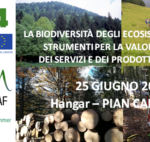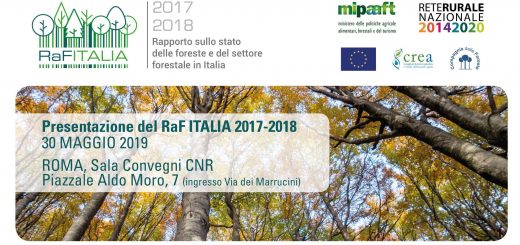Job opportunity: Developing and testing the energy budget in the land surface model ORCHIDEE
segnalato da Federico Magnani
Summary of post:
We are recruiting for a new (post-doctoral) position to play a key part in the development of a new implementation of the energy budget in the land surface model ORCHIDEE. The role is based at the LSCE and is anticipated for a period of 18 months.
The new energy budget implementation represents an exciting and innovative new development to the land surface scheme ORCHIDEE. This task will involve the testing, evaluation and refinement of an improved simulation of the energy balance that is already under development. Specific objectives for this role will include the identification and preparation of suitable data sets for the evaluation of the model; parameterisation and optimisation of the model as a result of running these tests and evaluation of new methods for specific physical processes that contribute to the energy budget, such as stomatal conductance.
Fuller description:
The objective of the DOFOCO project (for which this position is a part) is to quantify and understand the role of forest management in mitigating climate change. The only means by which the full consequences of land-use change can be evaluated over large regions is by means of surface layer model which simulates both the biogeochemical and biophysical pathways and is linked (‘coupled’) to an atmospheric circulation model. However, barring some site-specific models, the current generation of coupled land-atmosphere models have difficulties in being able to reproduce the observed site-level sensible and latent heat fluxes.
The energy budget model that has been developed so far involves the implementation of more than one canopy vegetation layer to simulate the effects of scalar gradients within the canopy for determining, more accurately, the net sensible and latent heat fluxes that are passed to the atmosphere. It includes representation of characteristics such as in-canopy transport, coupling with sensible heat flux from the soil, and a multilayer radiation budget. It has also been designed to run stably and efficiently when coupled LMDZ, a global atmospheric model.
However, to give an accurate a wide-scale simulation as possible, this model must be validated using data from measurement sites – this is the focus of this new research post.
So far this new model that has been validated on only a small number of test sites. This role involves applying it to a much broader range of simulations. There are a large number of long term measurement sites within the Fluxnet dataset, that correspond to a range of different canopy scenarios (such as heathland or forest of varying density). The objective here is to define the characteristics that most closely link the predictions of latent and sensible heat in the site-specific case to the general case, and so enable a large scale validation, including the simulation of extreme events such as heatwaves. Following the site-specific evaluations, the regional capacity of the new version of the model will be validated against remote sensing data. This coupled model will then be run at regional scale to again identify and evaluate the performance under extreme scenarios.
Skills that will be applied in this role include the processing of large datasets, the application of script-driven data analysis software such as Ferret and IDL, the review of new approaches in the scientific literature and the authoring of manuscripts for both internal and external dissemination. The model itself is coded in Fortran, and all updates are documented and disseminated throughout the user community. The successful candidate will work alongside existing team members who are concentrating on the physics and design of the new energy budget model, and on its broader implementation as part of the updated ORCHIDEE as a means to better simulate, understand and make predictions for the future implications of land use scenarios.
Home institution:
Laboratoire des Sciences du Climat et de l’Environnement (LSCE, Orme-les-Merisiers, Gif-sur-Yvette). LSCE is a joint research unit of Commissariat à L’Energie Atomique et des Energies Alternatives (CEA), Centre National de la Recherche Scientifique (CNRS) and Université de Versailles Saint Quentin-en-Yvelines (UVSQ). LSCE employs over 320 researchers covering 30 different nationalities. Their research mission is to contribute to a better understanding of the interactions between human activities in the Earth System, environment and climate dynamics at different time scales. LSCE is a world class institute and a thriving nexus for climate change research.
Qualifications required:
Given the interdisciplinary nature of the research we are seeking for a highly motivated individual with a degree (Master or PhD) in for example mathematics, physic, engineering, computer science, meteorology or theoretical ecology. A broad interest in natural sciences more specifically terrestrial ecology is essential. Rather than for a specific training, we are looking for a candidate who is able to demonstrate her/his ability to develop code (Fortran 90) and solve numerical schemes. Priority will be given to individuals who have published peer-reviewed papers but it is not a strict requirement.
Required content of the application:
There are no specified application forms. Applications and inquiries should be sent to Sebastiaan Luyssaert (Sebastiaan.Luyssaert__at__lsce.ipsl.fr).
Applications should include (1) a curriculum vitae, (2) statement of motivation, (3) a short description (½ page no more than 1 page) of a recent scientific problem you successfully solved and (4) names, addresses, phone numbers, and email addresses of at least two references. The position is available from October 1st and will remain open until filled with review of applications and interviews starting on June 3rd. Salary follows national directives and is adjusted for work experience. A dual position may be explored in case the partner has a competitive CV and background in line with the research activities at LSCE.
Info Autori
Scuola di scienze Agrarie, Forestali, Alimentari e Ambientali (SAFE-UNIBAS)






